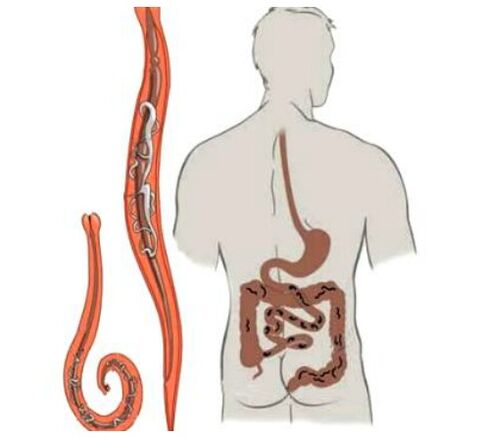The human body is an ideal environment for the habitat of pathogenic microorganisms that can affect almost any organ or system, which causes many diseases and disorders. Such organisms have a special place in parasites that live and feed on cells and other "owner" body nutrients. According to medical indicators, about 90% of the population of different age categories is carriers of parasites whose treatment and study are involved in the part of the medicine - parasitology. The term "parasites" mean different types of living organisms that have the ability to settle in the human body, introduce into the tissues of the internal organs, eat cells, juices or snacks. Foreign organisms can penetrate any part of our body and live in it for a long time or in the whole person's life. Some species of parasites in the human body do not cause any special changes, but there are those that can adversely affect the well -being of the "host" and cause serious illnesses. In such cases, we are talking about parasitic diseases that require immediate treatment. In medicine, parasites are called any pathogenic organisms that lead a parasitic lifestyle in the human body. This includes a variety of bacteria, viruses, fungi, as well as worms, simple, cellular, arthropod, protozoal invasions and other species.
What are parasitic diseases?

Parasitic diseases (invasions) are a large group of diseases caused by a variety of pathogenic organisms that live and multiply inside the person. There are about 300 types of parasites that can affect the human body. Parasitic diseases can be caused by both pathogenic bacteria as well as parasitic protozoa, arthropode, cellular and other parasites or viruses. The list of parasites in the human body is quite large, but despite the type, almost all of them relieve toxins that destroy the cellular structures, damage the internal organs, penetrate the lymphatic flow, blood that causes the body and the functioning of the internal organs.
Basically, pathogenic organisms consume nutrients that people get along with food. This behavior of "uninvited guests" may explain that many people who are guided by lifestyles control their health and food, will not get the desired result, as these "dear" have taken away all the best, leaving only a small particle of useful substances. These creatures are so insidious that they are often disguised as other diseases, and people can walk around doctors for years, but do not notice the positive result of treatment.
How do the parasites come into the human body?
Foreign organisms can penetrate the human body in several ways, but most often the infection occurs:
- Worms infected with water or soil.
- Food products that have not undergone the desired processing: poorly fried meat, fish, dirty vegetables, fruits, dairy products.
- Contact with domestic or homeless animals.
- Insect bite.
- Failure to comply with personal hygiene rules.
- Close contact with the parasite carrier.
Many parasites in the human body do not have a nervous, cardiovascular or respiratory system, but their reproductive organs can throw hundreds of thousands of ripe eggs into the environment. Parasites eggs and larvae are very stable, they can be in soil, water, food or personal items for a long time. For example, tapeworm eggs can withstand minus 15 degrees and maintain their vital action for 9 months. Almost all parasites have protective mechanisms that cannot be recognized and destroyed by the human body. That is why many parasitic diseases are difficult to diagnose. Pathogenic organisms can be both in the intestines, in the lungs, in the blood, in the liver, in the joints, in the brain and even in the eyes. The place of localization of pathogenic organisms depends on their type and other characteristics, both on the person and on the parasite itself.
The parasites in the body distinguish between substances that have been helping them to live in a person for many years. They do not have a digestive system, but nevertheless, parasites use only useful substances that enter the human body, which they can live for for many years, and people slowly lose their health, not doubting the true cause.
Special organisms use their "devices" to adapt to new conditions: marked hooks, plates, heavy hair, suction cups that constantly damage the mucous membranes of the organs. The parasites themselves may have a few millimeters of length up to a few meters, they also have the ability to put various toxins that poison the body as a whole, which not only causes disorders of the internal organs, but also inhibits immunity, destroys the beneficial bacteria of the gastrointestinal tract and is overloaded with liver waste.
Signs and symptoms of parasites in the body

Parasites in the body - Symptoms of their presence may not be similar to other diseases. For example, larvae in the lungs cause symptoms of pneumonia, pinworms - appendicitis and parasites - biliary tract paths or pancreatitis attack.
In addition, parasitic diseases can have frequent coldness, sore throat, bronchitis and other diseases. You may suspect the presence of parasites in the human body according to the following symptoms:
- Disorders in gastrointestinal tract work: diarrhea, flatness, frequent constipation, irritating bowel syndrome
- The pain of the joints and muscles
- Allergic skin reactions
- Anemia: Many "cohabitants" are fed by blood, which causes the development of iron deficiency anemia
- Reducing or increasing body weight
- Disorders in the work of the psyche. Toxins that distinguish parasites have a devastating effect on the nervous system, causing personality irritation, nervousness, frequent depression, panic attacks and other disorders
- Brooksism - toothpaste in a dream
- Intestinal dysbiosis
- Disorders in the work of the immune system. Many worms and parasites reduce the production of immunoglobulin A, which over time results in a decrease in immunity. A person is completely vulnerable to viral and infectious diseases
- Inflammatory processes of the respiratory tract
- Oncological diseases. The long finding of the parasite in the body causes a significant decrease in immunity and degeneration of epithelial cells in cancer
In addition to the above symptoms, parasitic invasions often damage the liver, kidneys, and cardiovascular system, which causes their activity to be disrupted and the development of many diseases that are difficult to treat. It is important to note that all of the above signs of parasites in the human body are not an accurate confirmation of their presence. Only a professional and high quality diagnosis will help determine the existence or absence of "uninvited guests".
How to acknowledge a parasitic disease
It is quite difficult to diagnose the presence of helminths, especially after infection. Until recently, the only way to identify "strangers" was to have a duodenal sound and feces analysis. The results of such studies have made it possible to identify fragments of parasites, larvae or eggs. However, such methods do not always provide reliable results. At this time, modern techniques are used to detect parasites, allowing you to identify almost any parasite.
- Calais analysis (held at least 3 times)
- Immunophormal analysis (ELISA)
- ELISA TESTS
- Serological research methods
- Ultrasound examination of internal organs (ultrasound)
- Computed tomography
- PCR Diagnostics offers parasites analysis based on DNA analysis
The results of the study allow not only to determine the presence of parasites in the body, but also to evaluate the condition of the internal organs, identifying other diseases or disorders.
Treatment of parasitic diseases
Treatment of parasitic diseases depends on many factors: specific type, its size, quantity, patient age, body weight and other characteristics. A large assortment of parasite drugs is given in the pharmaceutical market, but not all medicines can overcome a particular parasite. It is important to note that almost all parasites disrupt the functioning of the internal organs, so the patient should prescribe a comprehensive treatment aimed not only to destroy the invasion but also to restore the damaged internal organ.
In addition to synthetic medicines, antibiotic against worms, antiparasitic agents containing natural components are used to treat parasites. Such joints have no contraindications and will tolerate the human body well.
Only your doctor should treat parasitic diseases after the results of the study and after determining the pathogenic organism. The course of treatment, doses and names of the drug are individually prescribed for each patient. All antiparasitic medicines have great contraindications and side effects, so you need to consult a doctor before using them.
It is important for the treatment of parasites to use drugs that restore the functioning of the gastrointestinal tract, liver, kidneys, stimulate immunity, provide the body with vitamins. At least the main thing for the treatment of parasitic diseases is proper nutrition. Patients should exclude their diet with a diet of meat and dairy products as they are an ideal environment for parasites. It is also necessary to completely exclude the use of sugars, sweets. Nutrition should be balanced, high quality and useful for the body.
The prognosis after treatment of parasitic diseases is mainly favorable, but when large parasites in the body or significant damage to the internal organs are marked, it is difficult to predict the result after treatment.
Prevention of parasitic diseases

You can protect yourself from the penetration of parasites, but only if you observe simple rules. The prevention of parasites in the body is:
- Protecting the rules of personal hygiene
- Lack of contact with homeless animals
- Avoid pets
- Play with a child on the street to make sure he or she does not choose different items
- After playing a sand box, make sure you wash your hands
- While walking, do not eat in the street only after your hands are washed
- Regular cleaning of the house
- Use only washed and processed vegetables, fruits
- Eat only well -fried meat
- Drink only boiled water
- If any animal needs the whole family at home once every 6 months to prevent parasitic diseases.
Adherence to simple preventive rules will allow to protect against infection with parasites, thereby protecting yourself and your family from possible disorders in the work of internal organs, which are so often manifested in the wake of parasitic diseases.

















































